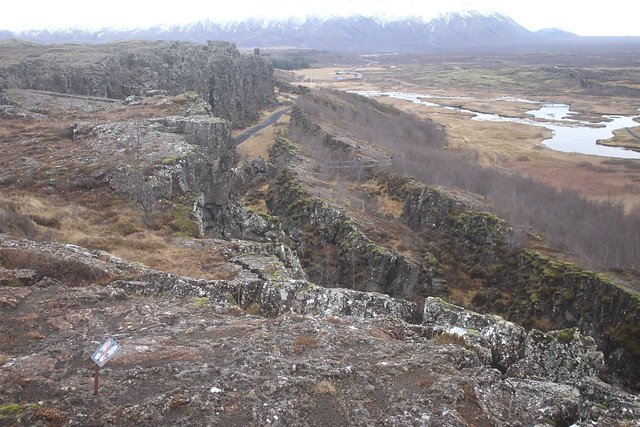On the edge of Europe
The loud, American, HR veterans group at breakfast had moved on to writing job descriptions. "I remember the first time I saw 'customer service' listed as a desirable quality - up until then, we'd just assumed it." Yawn. Pass the kiwi fruit.
Tuesday was our main tour day. We were to travel the Golden Circle. We weren't very clear what this meant, but it seemed to be the thing that you did in a day from Reykjavik. After breakfast we toddled down the hill to bus stop 14 and waited with a group of well-padded ladies from the north of England who were doing a similar tour but not in our group. Laura can't wait at bus-stops for long without getting bored and pining for coffee. I pointed out the bakery on the opposite corner and she went to get drinks. The well-padded northern gals watched her go, looked at the bakery sign and waddled after her to have a look too, but then their bus arrived and the one who'd been left behind gave a harsh whistle to summon them back quickly. They spoke to the bus driver in loud drawn out tones that showed they didn't expect him to understand English. He ignored it and just spoke back in perfect received pronunciation.
I did worry that we would be frozen icicles before our bus arrived, but the coffee helped and before we knew it the minibus had pulled up. We were the last but one group to join, so we managed to snaffle the front seats.
Reykjavik city centre is small but has lots of one-way streets so that it actually takes much longer to get out of the city than you'd think. And then you realise how little there is outside of the city. It stops quite abruptly and you've lava and mountains and fjords all around you.
We headed for the Þingvellir - the parliament assembly fields where the first Icelanders assembled to make decisions together about their society in 930 AD (yes 1090 years ago!). They are in the area that forms part of the Mid-Atlantic Ridge, ie the boundary between the North American and Eurasian tectonic plates. It being a day-long tour we didn't get to really soak up which bit was the Eurasian side and which the North American and see exactly where it lies, but it's roughly here.
And as well as interesting geography there are several lessons in the word Þingvellir about how Icelandic is pronounced. The letter Þ is pronounced as we do a voiceless 'th' like thing or thorough - Þing sounds very much like 'thing' except the 'i' is a little longer than English so it's more like 'ie' in thief. The next lesson is that the emphasis in Icelandic is always on the first syllable. I was tempted to say Þingvell-IR but it's not that at all it's ÞING-vellir. The double 'l' is not close to but no quite the welsh ll - it sounds more like 'tl' as in bottle. Finally, the 'r' on the end is rolled in the soft way that you sometimes hear Scottish people use, not a voiced trill but an almost breathed rrr. So it's THIENG-vetlirrrr.
I found myself throughout this trip sounding out the placenames on the signposts under my breath in the same way that I do when visiting Wales. I rarely have the courage to say them out loud to natives, but it makes me feel better to know that I do know how to say things properly. Even under my breath.
Onwards though, we had time to pop to the loo in the visitors centre and march briskly along that black trail you can see above and back again before we were back on the bus and off into the wilderness again.

That's a brutal landscape. They were hardy folk to colonise it. I'm impressed you found the appropriate character for the place name. I also try to work out place names when I travel. When I was in Ukraine I learned some of their alphabet and worked out that some names of things were pretty similar to English even if they looked very different written down.
To listen to the audio version of this article click on the play image.

Brought to you by @tts. If you find it useful please consider upvoting this reply.